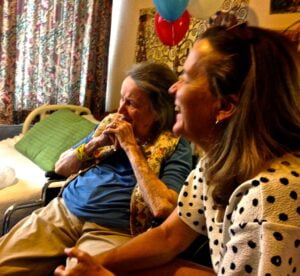
It’s Yom Kippur. The late September day is bright and sunny. I focus on the vivid blue sky, the architectural sweep of the soaring white clouds, the late summer breeze in the air before pulling open the nursing home’s heavy front door to enter a world unto itself, replete with its own atmosphere and gravity. I have forty-five minutes before I need to return to the temple for the rest of services. Mom lies asleep on her hospital bed, fully dressed for summer: yellow-checkered seersucker pants I recognize and a white lacy shirt that I don’t. Mom looks grey and waxy asleep on the bed. She wakes up as I pull up a chair. A huge smile breaks out on her face and bursts in my chest as joy.
“Hi Mother. How’s it with you today?”
She tugs on her hair and shrugs, really thinking about her answer. “Well, fine I suppose.”
I tell her about the day’s perfect weather, how it is bright and clear and warm outside. She tries to say something about the sun but struggles to find the words. Her fingers poke at her neck under the lacy collar. I slip my fingers to her collarbone and rub the soft loose folds of her neck. She shuts her eyes. “That feels good.”
I rub her neck and tell her about my day, about services, about how Jews fast on Yom Kippur but that I don’t because fasts remind me of when I stopped eating and tumbled head first into anorexia. I hate being hungry, I explain.
It had come upon me unawares when I was sixteen. A walk with a friend where she explained her sister had gone on a diet and she was too. I saw its effects and why she did the unthinkable—restrict her food intake. She looked better, as if she had been newly improved, her attractiveness enhanced, her mystery magnified. I determined to try it too. I took to food restriction like an alcoholic to her first drunk. I turned giddy with the sensation of limits and of the weight that began to pour off me. Within six months I had lost twenty pounds and within the year, forty. 120 minus 40= hospitalization. But the origins, as I came to learn, lay far deeper than a passing interest in dieting.
“I forgot about that,” Mom says. This is the casual everyday heartbreak of dementia. The saga of my hospitalizations, my descent into my own ring of suffering and the lasting imprint it left on my relationship with my mother, wiped away. It’s the latest iteration of the denial she accidentally on purpose imposed on me.
My efforts to learn how to stop eating followed the same path I had previously laid down to train myself to never go to my mother for comfort. As a girl the offering of my bruises and cuts and stormy transient upsets to Mom for care had never or almost never resulted in care. Nothing was big enough to secure her notice; no bruise long and purple enough (a nighttime game of hide and seek, me tumbling over the skeletal remains of a hammock frame left in the yard), no pain grand enough (the unnoticed fractured wrist from a long jump competition), no illness worrisome enough (a bleeding ulcer in fifth grade) to win Mom’s notice. Do not go to Mother with your troubles. I count that insight among my most fundamental and brilliant. It was hard, particularly when blood was involved. The child inside my nine and ten and eleven-year-old body wanted only Mom, only the sweet love she could dispense. But the subsequent disappointment so upset me that I knew it would kill me. Her attention was too unpredictable. When it was good, I nearly burst a seam with joy but when it was absent all I could do was blame myself (someone had to pay). I trained to recognize the impulse arising in me for comfort and wrestle with it enough to get it under ropes. I will take care of myself.
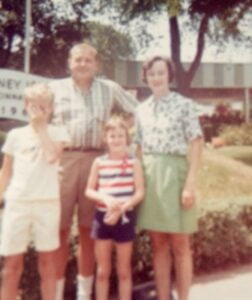
It wasn’t that Mom was a bad mom. All children were neglected in the 1960s from what I could see. We were told to figure it out. Kids in my family were expected to be self-sufficient (Mom like to joke that she preferred “withdrawn” children). That meant Claire and I (not Naomi or Ernie) were expected to be good. I learned to apply the bandage, the clean sheets, a way to carry my upset. I was a seedling without sufficient soil to grow. I pseudo- grew. I was a surrogate of myself, hollowed out by a loneliness I could barely understand. My limbs grew, my face changed, I moved from grade to grade, but all was not right in me. In elementary school I cried when I left the always female teacher on summer’s leading edge. I had no idea why. I cried when my always female Sunday school teacher (most likely a mother of a friend) graduated us to another teacher. I cried when summer camp ended. I cried when summer ended. When Christmas ended. When I left for a new middle school and then again when Mom insisted Claire and I go to a private high school. And I hid my tears. I cried them to myself at night in bed. I knew not to bring these amorphous troubles to my parents. I might be able to present myself in an exactly perfect way for whatever mood they were in; maybe I could capture their attention by my smarts or humor and harness it for a minute or two. Maybe then I could taste the fullness of their attention. But inevitably I failed to read the moment with such exacting precision. Their eyes wandered, the drinks called them, the roast needed turning, the phone answering. And I would be left with a corrosive disappointment I turned against myself. I trained to hide what I needed. I watered myself with tears. I’m not the only one to have grown up this way. There is nothing special about my pain beyond that it is mine. This is the path, the way of childhood, the long road we all walk to find inner safety. Pain, be gone to the bowels of the world. It waited for me, not always quietly.
As I said, I stumbled into anorexia by accident, which was still possible in the 1970s. No one had heard of such an exotic illness when I got my diagnosis. The summer between tenth and eleventh grade, restriction became my drug and frenzied activities, including long nighttime walks, my antidote to the hunger. By the time my junior year was rounding its last curve, I had lost so much weight I stopped menstruating. I had sailed from being an object of fascination to a full fledge mystery to my former friends.
Through those months, before the way out of my little game closed, I practiced restricting my food intake to know just how much hunger I could take before passing out when I stood up. I practiced pushing the hunger away with gum, with food chewed and not swallowed, with raisins. Then I practiced numbing myself around the hunger. I skipped breakfast and eventually lunch, getting my energy from Tab, a zero-calorie caffeine soda. When my theatre teacher confronted me after school that spring, it was she who handed me the word anorexic. As in you are an anorexic. I had to look it up. I came home that night and announced it to my family at the dinner table where for months I had left my plate full. “I have anorexia.”
“No, you don’t,” Mom said immediately.
“Yes, I do. I can’t eat. I haven’t had a period this year.” I had lost twenty-five of the forty pounds I would eventually shed. The fact my theatre teacher noticed my weight loss confused me. Yes, I wanted the world to celebrate my discipline, but she was offering something entirely different. She saw my pain, decoded it from my cryptic symbolism. She saw that I had shed more than weight. I had shed my enthusiasm, my silliness and athleticism (not my high grades or aspirations. I was the rising president of the student council). I felt understood and unsettled by her attention. It was exactly what I wanted and it scared me, sent me scattering like marbles. I cried and I dissembled and she would not let me wiggle away. But here with my parents, it was a different conversation. My mother couldn’t stand it.
“You let this get out of hand. Just eat. That’s all it will take.” Even I saw the absurdity of me trying to convince her of what was so clear to everyone else. Our back and forth went on like this for a while.
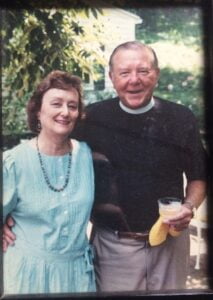 David and I have a word for this quality of my parents. During the 1980s, before we had children, we came back to their home in Cincinnati for Christmas. The summer before Claire had given Mom and Dad a pair of love birds. I walked over to inspect the birds in the large cage that stood next to the wide window in the living room. David joined me and said, “What is wrong with that one’s beak?”
David and I have a word for this quality of my parents. During the 1980s, before we had children, we came back to their home in Cincinnati for Christmas. The summer before Claire had given Mom and Dad a pair of love birds. I walked over to inspect the birds in the large cage that stood next to the wide window in the living room. David joined me and said, “What is wrong with that one’s beak?”
“It had a fungus but it’s getting better,” Mom called out cheerfully.
The beak was nearly hanging off the bird’s tiny head.
“The beak” is all we have to say whenever what is obvious goes unnoticed, when denial has arrived, when anxiety blinds us to seeing pain. While my parents eventually accepted the term anorexic as descriptive of me in those years, they stayed firm in their belief my beak would not fall off. But it came so close.
Back in Mom’s room I shift my fingers to the other side of her neck. “That side doesn’t itch,” she states. I move them back.
“Everyone at my house is grumpy, so I’m happy to come visit you,” I push on, letting the past drift around me like a vapor.
“I don’t think about that anymore.”
I’m not sure if this refers to grumpy family members or Jewish holidays. I remind her that she never celebrated Rosh Hashanah or Yom Kippur because she is Episcopalian. “You followed the Christian holiday schedule, Mom. Remember Lent and Easter and Advent and Christmas? You did all that. You even changed candles in the house to match the color of the religious seasons.” Mom’s attention to candles was impressive, even then. When Claire and I packed up her apartment, we found enough candles to supply a mall kiosk.
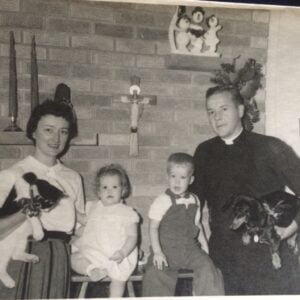 “I did?” She seems surprised. I sit back in my seat. I remind her of her mother’s love of Easter, how Grandma Mabel said the church chorus sounded like angels, and when all the kids got a potted violet, I always gave mine to Grandma because I loved her so. Loving my mother’s mother was my first tutorial in how to see past words to find the heart of the storyteller. Grandma was mean as a snake but she radiated a fiercely burning light I regularly warmed myself with, despite the barrage of criticism she lobbed at all things human and canine.
“I did?” She seems surprised. I sit back in my seat. I remind her of her mother’s love of Easter, how Grandma Mabel said the church chorus sounded like angels, and when all the kids got a potted violet, I always gave mine to Grandma because I loved her so. Loving my mother’s mother was my first tutorial in how to see past words to find the heart of the storyteller. Grandma was mean as a snake but she radiated a fiercely burning light I regularly warmed myself with, despite the barrage of criticism she lobbed at all things human and canine.
“I don’t remember that. I don’t remember her like that,” Mom says.
A text from my daughter interrupts us. “I have to pick her up before I go back to Temple,” I say, putting away my phone. “I have to go in fifteen minutes.”
“Why?” Mom has forgotten that I have to go back to services, that everyone at my house is grumpy from fasting, that I came to see her to get away from all the soul searching inspired by the liturgy of Yom Kipper. “It’s terrible that I don’t remember. There is so much I don’t know.” I rub the soft skin of her collarbone. She shuts her eyes. “I should try harder…”
“Mom, it’s not your fault that you don’t remember.”
“It isn’t?” The innocence in her voice cuts me.
“Well, for one, you have dementia so your brain is like a bucket with holes in it. Things just fall out of it and there’s nothing you can do about that. And two–I know this is going to come as a shock–you are 88.”
“I am?” She screws her face in disbelief. When asked, Mom says she is in her thirties. It makes odd sense that I feel like a teenager with her.
I laugh. “Yes, you are.”
“Oh my.” Her face crumples up and she shakes her head. “How did that happen?”
“It happens to the best of us, Mom.”
“I can’t remember. It is wrong that I can’t remember.” Mom’s analytical mind, always sharp despite the weight of her chronic anxiety, is intact and even possibly more pronounced as she grows less burdened from memory. I am stunned by what she notices and comments on about her self, despite the loss of her own sense of history and the world of specifics that make us who we are. She has moments of being very aware of what she can no longer grasp.
“But when I tell you things, you remember, right? Things come back. You told me about Jack the dog.” I switch tactics. “You know, Mom, some people practice letting go of the past and the future. They work hard to be in the moment they are having right now. You enjoy life as it happens, Mom, each minute. Like it’s new.”
“That’s good, I guess.” She smiles.
We start again. Mom struggles to find the name of her sister. I give it to her. “How Alice…” She struggles to find the word. She shuts her eyes and searches. I give her a word. Close enough. We jump like in a game of leapfrog. How Alice pushed her to go to … She pauses, lips trying to locate her meaning. I offer her a word. No. Another. No. “School,” she gets out.
“To Sweet Briar?”
“Yes. Go to Sweet Briar.” Ernestine graduated from the all-women’s college in the early 1940s.
“But why?” I ask.
“Alice . . . she wanted . . . we had to be, to go. Father, he didn’t…he wasn’t educated. Mother wanted us girls to be educated. I don’t know why. The boy couldn’t be.”
 In Mom’s head, our family tree is more like a pile of leaves than a genealogy. Alice could very well be her mother; her father could be my brother or her husband. It doesn’t matter. For the little girl inside of me, it matters only to keep her talking and keep her connecting words and images, however fragmentary. I keep the balloon of her memory airborne in a slow game of back and forth. I remind her about Alice being sent home from art school in Paris because of the war, how Jane had gone to Cornell and nearly graduated from medical school before marriage stopped her, how at Sweet Briar she had had to wait tables at the cafeteria because the employees had taken better jobs doing war work. I tell her she had been happy there. Mom nods.
In Mom’s head, our family tree is more like a pile of leaves than a genealogy. Alice could very well be her mother; her father could be my brother or her husband. It doesn’t matter. For the little girl inside of me, it matters only to keep her talking and keep her connecting words and images, however fragmentary. I keep the balloon of her memory airborne in a slow game of back and forth. I remind her about Alice being sent home from art school in Paris because of the war, how Jane had gone to Cornell and nearly graduated from medical school before marriage stopped her, how at Sweet Briar she had had to wait tables at the cafeteria because the employees had taken better jobs doing war work. I tell her she had been happy there. Mom nods.
“Yes. I don’t know why. The words make me happy for some reason.”
What can I say to that? I’m happy the memory brings her a feeling, that these words return a piece of herself to herself for a few minutes. I don’t tell her how this new memory, the one happening right here and now, is settling into my body as a pleasure I hope never to forget. I am not sure why but it matters to me that I can be with her in this moment, as she is now, and so I keep handing back to her the things that she has lost.
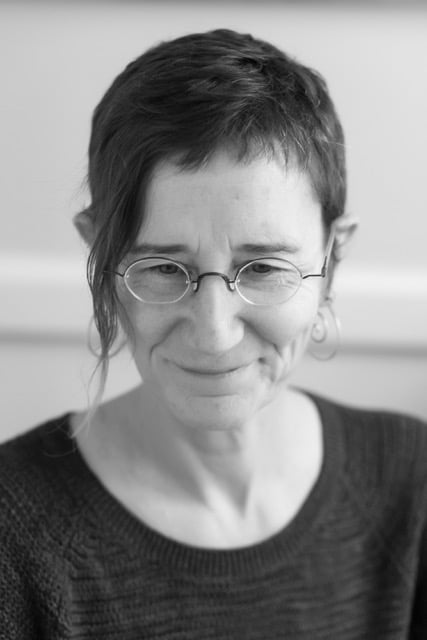



One Response
Lovely to read this, all of it. Thanks you for finding the words.